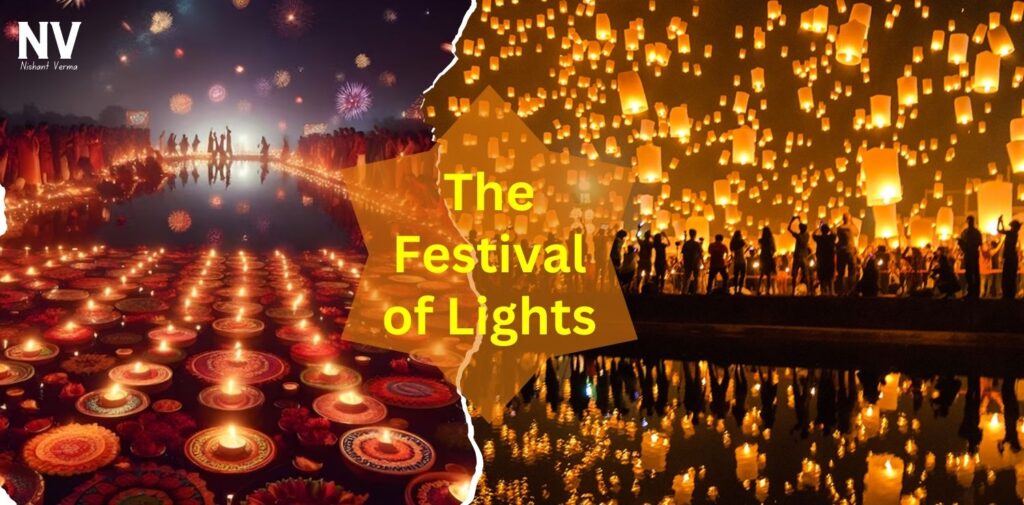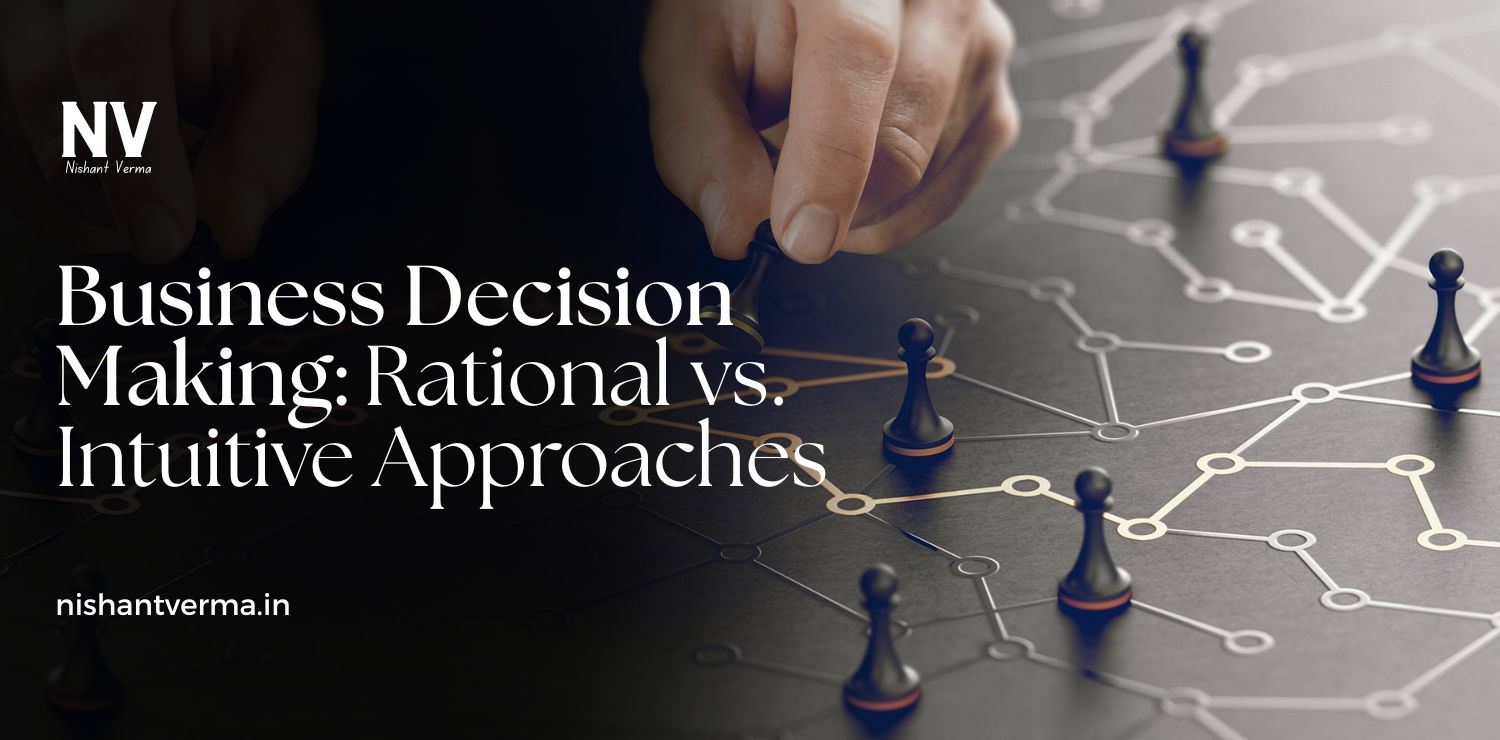Deepavali, commonly known as Diwali, is one of the most celebrated festivals in India and among Indian communities around the world. Known as the “Festival of Lights,” it symbolizes the triumph of light over darkness, good over evil, and knowledge over ignorance. This festival is celebrated with great enthusiasm, joy, and a sense of togetherness. In this article, we will explore the origins, significance, rituals, customs, and the various ways Deepavali is celebrated across different cultures.
Historical Background
The word “Deepavali” comes from the Sanskrit words “Deepa” (light) and “Avali” (row), which means a row of lights. The festival has ancient roots, with references found in Hindu scriptures and folklore. It is believed to commemorate several historical events, including:
- Return of Lord Rama: One of the most popular legends associated with Deepavali is the return of Lord Rama to Ayodhya after defeating the demon king Ravana. The people of Ayodhya lit oil lamps to celebrate his victory and welcome him home.
- Goddess Lakshmi’s Arrival: Diwali is also associated with Goddess Lakshmi, the goddess of wealth and prosperity. It is believed that she visits homes during Deepavali, and thus people clean and decorate their homes to welcome her.
- Lord Krishna’s Victory: In some regions, Deepavali marks the victory of Lord Krishna over the demon Narakasura. The defeat of Narakasura symbolizes the removal of evil.
- Jain and Sikh Celebrations: For Jains, Deepavali marks the day Lord Mahavira attained Nirvana. For Sikhs, it is celebrated as Bandi Chhor Divas, commemorating the release of Guru Hargobind Ji from imprisonment.
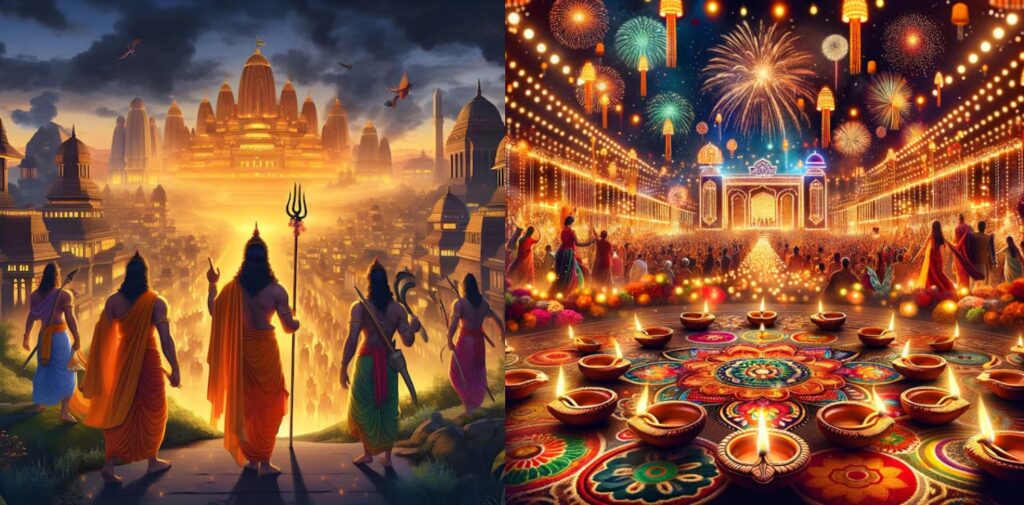
Significance of Deepavali
Deepavali holds deep spiritual significance and is celebrated not just as a festival but as a time for reflection and renewal. Here are some key aspects of its significance:
- Victory of Good Over Evil: The festival serves as a reminder that good will always triumph over evil, encouraging individuals to cultivate virtuous qualities.
- Renewal and Forgiveness: Deepavali promotes forgiveness and renewal, allowing people to let go of past grievances and start afresh.
- Cultural Unity: Diwali fosters a sense of unity among diverse communities. It encourages people from different backgrounds to come together, celebrate, and share joy.
- Spiritual Awakening: The lighting of lamps symbolizes the illumination of the mind and soul. It encourages self-reflection and spiritual growth.
Rituals and Customs
Deepavali is celebrated over five days, each with its significance and rituals. Here is a breakdown of the five days:
Day 1: Dhanteras
- Significance: The first day of Deepavali is known as Dhanteras, which is dedicated to wealth and prosperity.
- Rituals: People clean and decorate their homes, and buy new utensils or gold to welcome prosperity. In the evening, they worship Lord Dhanvantari, the god of Ayurveda, and Goddess Lakshmi.
Day 2: Naraka Chaturdashi (Choti Diwali)
- Significance: The second day is celebrated as Naraka Chaturdashi, marking the defeat of Narakasura by Lord Krishna.
- Rituals: Early morning baths are taken to purify oneself, followed by prayers. People light lamps and burst crackers to celebrate the victory of good over evil.
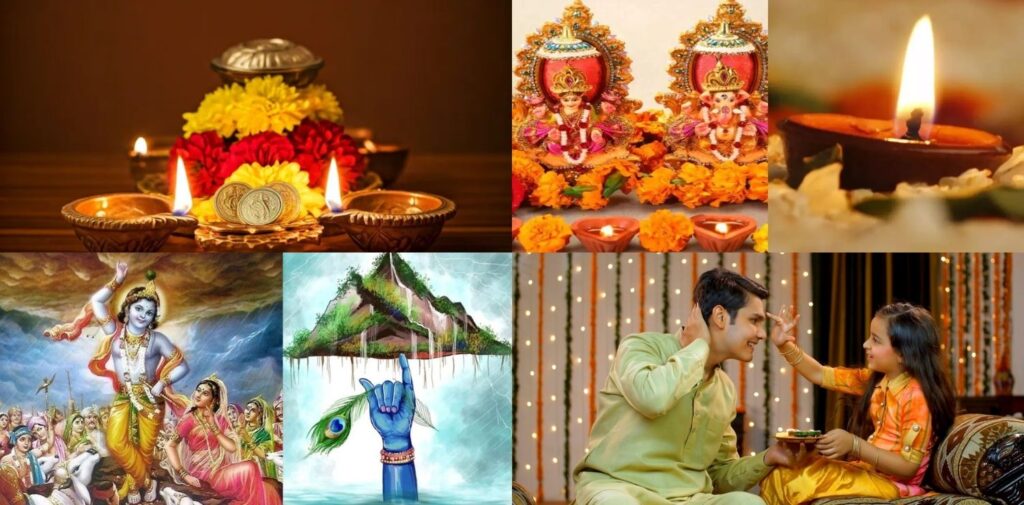
Day 3: Deepavali (Lakshmi Puja)
- Significance: The third day is the main day of Diwali, dedicated to Goddess Lakshmi.
- Rituals: Homes are illuminated with lamps and candles. Families perform Lakshmi Puja in the evening, offering prayers and sweets to the goddess. Fireworks light up the night sky as people celebrate together.
Day 4: Govardhan Puja
- Significance: The fourth day celebrates the lifting of Mount Govardhan by Lord Krishna.
- Rituals: People prepare and offer a variety of vegetarian dishes, particularly a mountain of food representing Govardhan Hill. In some regions, this day is also celebrated as Bhai Dooj, honoring the bond between brothers and sisters.
Day 5: Bhai Dooj
- Significance: The final day, Bhai Dooj, celebrates the bond between brothers and sisters.
- Rituals: Sisters pray for the long life and prosperity of their brothers, while brothers give gifts in return. It strengthens familial bonds and emphasizes the importance of relationships.
Preparations for Deepavali
The excitement for Deepavali begins weeks in advance. Here are some common preparations:
- Cleaning and Decorating Homes: People thoroughly clean their homes to remove clutter and dust. They decorate their homes with colourful rangoli (designs made with coloured powders), lights, and flowers to create a festive atmosphere.
- Shopping: Purchasing new clothes, sweets, and gifts is an integral part of the preparations. Markets are bustling with activity as people buy items for the celebrations.
- Making Sweets and Snacks: Preparing traditional sweets and snacks is a cherished custom. Items like ladoos, barfis, and chaklis are commonly made at home and shared with friends and family.
- Lighting Diyas: The lighting of oil lamps (diyas) is a key part of the festival. People place them around their homes, symbolizing the arrival of light and positivity.
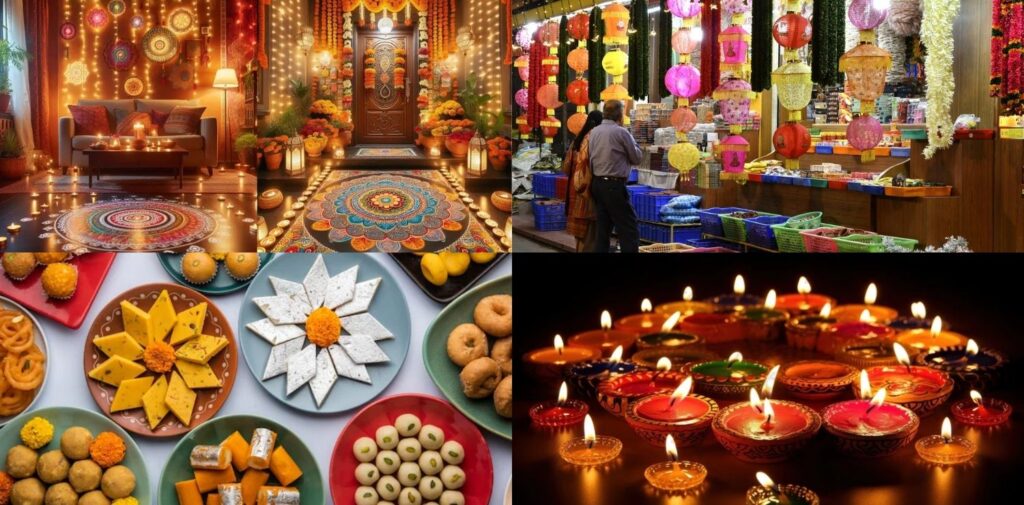
Celebrations Across Cultures
While Deepavali is predominantly a Hindu festival, it is celebrated by people of various religions and communities, each adding its unique flavour. Here are some examples of how Deepavali is celebrated across different cultures:
In Northern India
In northern states, particularly in Uttar Pradesh and Punjab, the festival is marked by grand celebrations, including:
- Fireworks: Cities come alive with fireworks displays, and the sky is illuminated with colourful bursts of light.
- Family Gatherings: Families come together to celebrate, share meals, and exchange gifts.
In Southern India
In southern states like Tamil Nadu and Karnataka, Deepavali is celebrated with a focus on family and community.
- Oil Baths: People wake up early and take oil baths as a ritual of purification.
- Karthigai Deepam: In Tamil Nadu, the festival coincides with Karthigai Deepam, where people light lamps and offer prayers.
In Western India
In states like Gujarat and Maharashtra, Deepavali celebrations include vibrant traditions:
- Dhanteras: The festival begins with Dhanteras, where people buy new items, especially gold and silver.
- Gifting: Exchanging gifts and sweets with friends and relatives is a common practice.
In Eastern India
In Bengal, Deepavali is celebrated with a focus on Goddess Kali:
- Kali Puja: The worship of Goddess Kali is prominent, with elaborate rituals and offerings.
- Cultural Events: Many cultural programs, including dance and music performances, take place during this time.
In Abroad
Deepavali is celebrated by Indian communities worldwide, including in countries like Nepal, Malaysia, Singapore, and Trinidad and Tobago. Each region adds its unique customs and flavors, showcasing the festival’s universal appeal.
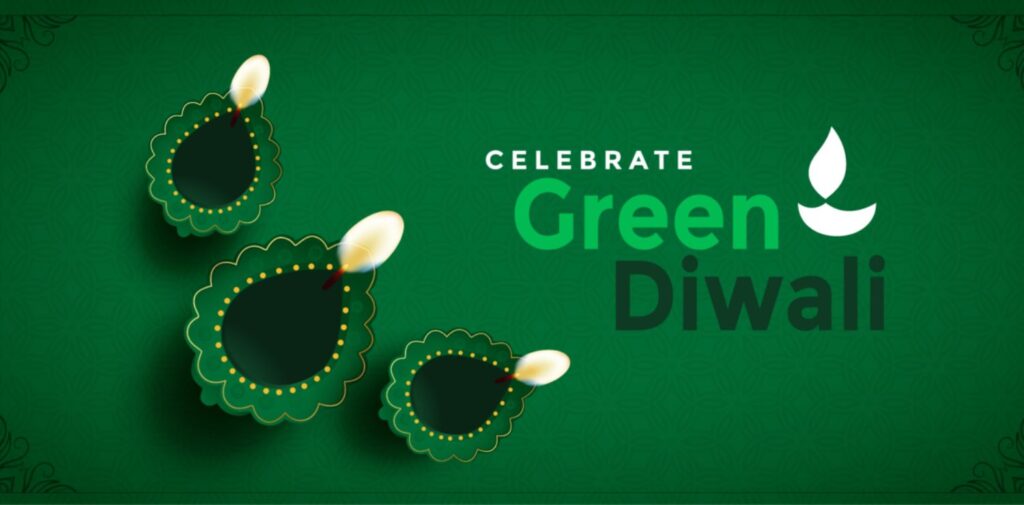
Environmental Considerations
In recent years, there has been a growing awareness of the environmental impact of Diwali celebrations, particularly concerning fireworks and pollution. Many communities are now opting for eco-friendly celebrations:
- Green Fireworks: Some people are choosing to use eco-friendly fireworks that produce less pollution.
- Planting Trees: Many communities have started initiatives to plant trees during Deepavali as a way to give back to nature.
- Sustainable Practices: Emphasizing sustainable practices in decorating homes and preparing food is becoming more common.
Conclusion: Deepavali 2024
Deepavali is more than just a festival; it is a time for reflection, renewal, and celebration of life. Its rich traditions and cultural significance transcend boundaries, bringing people together in joy and harmony. As we celebrate this Festival of Lights, let us remember its core values of goodness, compassion, and unity. Whether through the flickering of diyas, the sharing of sweets, or the warmth of family gatherings, Deepavali teaches us the importance of spreading light in our lives and the lives of others.

